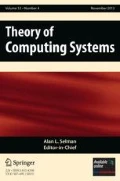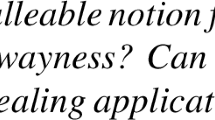Abstract
In complexity theory a one-way function is defined to be a one-one, honest, function that is computable in polynomial time whose inverse is not computable in polynomial time. We examine relationships between the complexity of functional computational problems and ordinary set recognition problems. The complexity of inverting one-way functions follows from these relationships. Then we survey various forms of one-way functions that have arisen in relationship to some cryptographic investigations and in relationship to the isomorphism problem.
Similar content being viewed by others
References
L. Berman. Polynomial Reducibilities and Complete Sets. Ph.D. thesis, Cornell University, Ithaca, NY, 1977.
L. Berman and H. Hartmanis. On isomorphisms and density of NP and other complete sets. SIAM J. Comput., 6:305–322, 1977.
K. Ganesan. Complete Problems, Creative Sets and Isomorphism Conjectures. Ph.D. thesis, Boston University, Boston, MA, 1989.
J. Grollmann and A. Selman. Complexity measures for public-key cryptosystems. In Proc. 25th IEEE Symp. on Foundations of Computer Science, pp. 495–503, 1984.
J. Grollmann and A. Selman. Complexity measures for public-key cryptosystems. SIAM J. Comput., 17(2):309–335, 1988.
D. Joseph and P. Young. Some remarks on witness functions for non-polynomial and non-complete sets in NP. Theoret. Comput. Sci., 39:225–237, 1985.
D. Joseph and P. Young. Self-reducibility: the effects of internal structure on computational complexity. In A. Selman, editor, Complexity Theory Retrospective, pp. 82–107. Springer-Verlag, New York, 1990.
K. Ko. On some natural complete operators. Theoret. Comput. Sci., 37:1–30, 1985.
K. Ko, T. Long, and D. Du. A note on one-way functions and polynomial-time isomorphisms. Theoret. Comput. Sci., 47:263–276, 1987.
K. Ko and D. Moore. Completeness, approximation and density. SIAM J. Comput., 10(4): 787–796, 1981.
M. Krentel. The complexity of optimization problems. J. Comput. System Sci., 36:490–509, 1988.
S. Kurtz, S. Mahaney, and J. Royer. The isomorphism conjecture fails relative to a random oracle. In Proc. 21st Annual ACM Symp. on Theory of Computing, pp. 157–166, 1989.
S. Kurtz, S. Mahaney, and J. Royer. The structure of complete degrees. In A. Selman, editor, Complexity Theory Retrospective, pp. 108–146. Springer-Verlag, New York, 1990.
S. Mahaney and P. Young. Orderings of polynomial isomorphism types. Theoret. Comput. Sci, 39(2):207–224, 1985.
G. Miller. Reimann's hypothesis and tests for primality. J. Comput. System Sci, 13:300–317, 1976.
J. Myhill. Creative sets. Z. Math. Logik Grundlag. Math., 1:97–108, 1955.
E. Post. Recursively enumerable sets of integers and their decision problems. Bull. Amer. Math. Soc., 50:284–316, 1944.
A. Selman. Polynomial time enumeration reducibility. SIAM J. Comput., 7(4):440–457, 1978.
A. Selman. Natural self-reducible sets. SIAM J. Comput., 17:989–996, 1988.
A. Selman, Xu M.-R., and R. Book. Positive relativizations of complexity classes. SIAM J. Comput., 12:465–479, 1983.
S. Toda. On the computational power of PP and ⊕P. In Proc. 30th IEEE Symp. on Foundations of Computer Science, pp. 514–519, 1989.
L. Valiant. Relative complexity of checking and evaluating. Inform. Process. Lett., 5(1):20–23, 1976.
J. Wang. On P-creative sets vs. P-completely creative sets. In Proc. 4th IEEE Structure in Complexity Theory Conference, pp. 24–33, 1989.
J. Wang. Polynomial Time Creativity and Its Applications. Ph.D. thesis, Boston University, Boston, MA, 1990.
J. Wang. Some remarks on polynomial time isomorphisms. Manuscript, 1990.
O. Watanabe. On one-one polynomial time equivalence relations. Theoret. Comput. Sci., 38:157–165, 1985.
P. Young. Juris Hartmanis: Fundamental contributions to isomorphism problems. In A, Selman, editor, Complexity Theory Retrospective, pp. 28–58. Springer-Verlag, New York, 1990.
Author information
Authors and Affiliations
Additional information
The author acknowledges support by the National Science Foundation under Grant CCR-9002292.
Rights and permissions
About this article
Cite this article
Selman, A.L. A survey of one-way functions in complexity theory. Math. Systems Theory 25, 203–221 (1992). https://doi.org/10.1007/BF01374525
Received:
Revised:
Accepted:
Issue Date:
DOI: https://doi.org/10.1007/BF01374525




